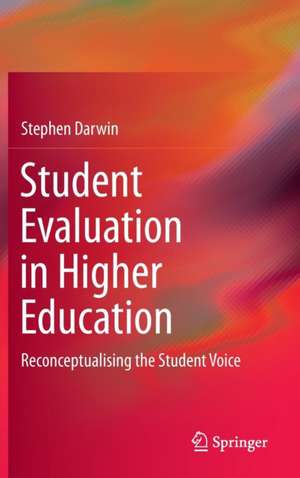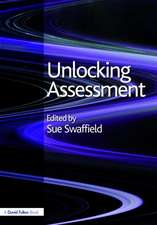Student Evaluation in Higher Education: Reconceptualising the Student Voice
Autor Stephen Darwinen Limba Engleză Hardback – 29 iul 2016
The book systematically assesses the core assumptions underpinning the design of student evaluation models as a tool to improve the quality of teaching. It also analyses the emerging influence of student opinion as a key metric and a powerful proxy for assuring the quality of teachers, teaching and courses in universities. Using the voices of teachers in the day-to-day practices of higher education, the book also explores the actual perceptions held by academics about student evaluation.
It offers the first real attempt to critically analyse the developing influence of student evaluation on contemporary approaches to academic teaching. Using a practice-based perspective and the powerful explanatory potential of cultural historical activity theory (CHAT), the implications of the changing focus in the use of the student voice - from development to measurement - are systematically explored and assessed.
Importantly, using the evidence provided by a unique series of practice-based case studies, the book also offers powerful new insights into how the student voice can be reconceptualised to more effectively improve the quality of teaching, curriculum and assessment. Based on this empirical analysis, a series of practical strategies are proposed to enhance the work of student evaluation in the future university to drive pedagogical innovation.
This unique volume provides those interested in student evaluation with a more complex understanding of the development, contemporary function and future potential of the student voice. It also demonstrates how the student voice - in combination with professional dialogue - can be used to encourage more powerful and substantial forms of pedagogical improvement and academic development in higher education environments.
| Toate formatele și edițiile | Preț | Express |
|---|---|---|
| Paperback (1) | 692.56 lei 6-8 săpt. | |
| Springer International Publishing – 30 mai 2018 | 692.56 lei 6-8 săpt. | |
| Hardback (1) | 698.62 lei 6-8 săpt. | |
| Springer International Publishing – 29 iul 2016 | 698.62 lei 6-8 săpt. |
Preț: 698.62 lei
Preț vechi: 821.91 lei
-15% Nou
Puncte Express: 1048
Preț estimativ în valută:
133.68€ • 137.91$ • 111.56£
133.68€ • 137.91$ • 111.56£
Carte tipărită la comandă
Livrare economică 26 martie-09 aprilie
Preluare comenzi: 021 569.72.76
Specificații
ISBN-13: 9783319418926
ISBN-10: 3319418920
Pagini: 135
Ilustrații: XXI, 185 p. 3 illus.
Dimensiuni: 155 x 235 x 13 mm
Greutate: 0.47 kg
Ediția:1st ed. 2016
Editura: Springer International Publishing
Colecția Springer
Locul publicării:Cham, Switzerland
ISBN-10: 3319418920
Pagini: 135
Ilustrații: XXI, 185 p. 3 illus.
Dimensiuni: 155 x 235 x 13 mm
Greutate: 0.47 kg
Ediția:1st ed. 2016
Editura: Springer International Publishing
Colecția Springer
Locul publicării:Cham, Switzerland
Cuprins
1. The Emergence of Student Evaluation in Higher Education.- 2. Research on the Design and Function of Student Evaluation.- 3. What Higher Education Teachers Think about Quantitative Student Evaluation.- 4. Analysing the Potential of Student Evaluation in Practice.- 5. Student Evaluation in Situated Practice—the Case of a Recently Designed Program.- 6. Student Evaluation in Situated Practice - the Case of an Established Program.- 7. Assurance or Improvement: What Work Can Student Evaluation Most Effectively Perform?.- 8. Assessing the Developmental Potential of Student Feedback.- 9. Charting New Approaches to Student Evaluation.
Textul de pe ultima copertă
This book provides a comprehensive and engaging analysis of the purpose and function of student evaluation in higher education. It explores its foundations and the emerging functions, as well as its future potential to improve the quality of university teaching and student learning.
The book systematically assesses the core assumptions underpinning the design of student evaluation models as a tool to improve the quality of teaching. It also analyses the emerging influence of student opinion as a key metric and a powerful proxy for assuring the quality of teachers, teaching and courses in universities. Using the voices of teachers in the day-to-day practices of higher education, the book also explores the actual perceptions held by academics about student evaluation.
It offers the first real attempt to critically analyse the developing influence of student evaluation on contemporary approaches to academic teaching. Using a practice-based perspective and the powerful explanatory potential of cultural historical activity theory (CHAT), the implications of the changing focus in the use of the student voice - from development to measurement - are systematically explored and assessed.
Importantly, using the evidence provided by a unique series of practice-based case studies, the book also offers powerful new insights into how the student voice can be reconceptualised to more effectively improve the quality of teaching, curriculum and assessment. Based on this empirical analysis, a series of practical strategies are proposed to enhance the work of student evaluation in the future university to drive pedagogical innovation.
This unique volume provides those interested in student evaluation with a more complex understanding of the development, contemporary function and future potential of the student voice. It also demonstrates how the student voice - in combination with professional dialogue - can be used to encourage more powerful and substantial forms of pedagogical improvement and academic development in higher education environments.
The book systematically assesses the core assumptions underpinning the design of student evaluation models as a tool to improve the quality of teaching. It also analyses the emerging influence of student opinion as a key metric and a powerful proxy for assuring the quality of teachers, teaching and courses in universities. Using the voices of teachers in the day-to-day practices of higher education, the book also explores the actual perceptions held by academics about student evaluation.
It offers the first real attempt to critically analyse the developing influence of student evaluation on contemporary approaches to academic teaching. Using a practice-based perspective and the powerful explanatory potential of cultural historical activity theory (CHAT), the implications of the changing focus in the use of the student voice - from development to measurement - are systematically explored and assessed.
Importantly, using the evidence provided by a unique series of practice-based case studies, the book also offers powerful new insights into how the student voice can be reconceptualised to more effectively improve the quality of teaching, curriculum and assessment. Based on this empirical analysis, a series of practical strategies are proposed to enhance the work of student evaluation in the future university to drive pedagogical innovation.
This unique volume provides those interested in student evaluation with a more complex understanding of the development, contemporary function and future potential of the student voice. It also demonstrates how the student voice - in combination with professional dialogue - can be used to encourage more powerful and substantial forms of pedagogical improvement and academic development in higher education environments.
Caracteristici
Comprehensive and engaging exploration of student evaluation in higher education Analysis of the conventional role, emerging functions and future potential of the student voice Provides a unique insight into contemporary academic perceptions of student evaluation Using practice-based case studies, offers new and powerful insights into the use of the student voice Offers new student evaluation strategies to drive pedagogical innovation in the future university Includes supplementary material: sn.pub/extras







